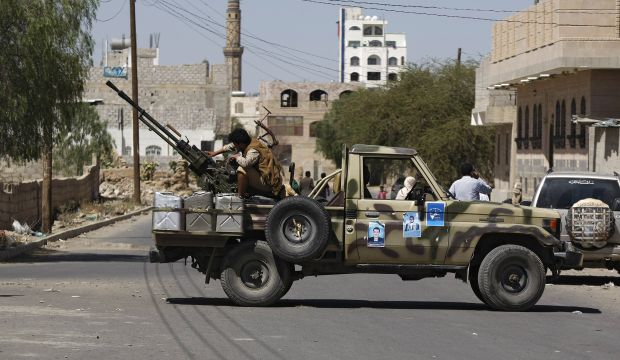
A Houthi Shi’ite rebel mans a machine gun mounted on a military truck in Sana’a, Yemen, on October 20, 2014.
(AP Photo/Hani Mohammed)
Sana’a, Asharq Al-Awsat—Shi’ite Houthi fighters are seeking to take control of strategic military weapons, including long-range missiles capable of striking neighboring Gulf states, head of Yemen’s Aba’d Center for Strategic Studies warned.
In comments to Asharq Al-Awsat, head of the Aba’d Center, Abdulsalam Mohammed, said: “By targeting Arhab [in Sana’a governorate], the Houthis are seeking to gain control of vital strategic military sites, particularly in the mountains overlooking Sana’a, as well as military sites within the capital itself. This includes some of the most important military camps which include strategic long-range missiles that could strike neighboring Gulf states.”
Mohammed criticized the Houthis’ violating of the Peace and National Partnership agreement with Yemeni President Abd Rabbuh Mansur Hadi.
The Shi’ite militia has increasingly begun to target political rivals, including the leadership of the Al-Islah party, after talks between the two stalled last week.
“The talks failed after the Houthis targeted Arhab and its tribes, particularly those allied to Al-Islah,” Mohammed said.
“The differences between the two are based on Al-Islah accusing the Houthis of undermining the sovereignty of the state, seeking to carry out state functions like keeping the peace and combating terrorism,” he added.
Speaking on Monday, Prime Minister Khaled Bahah stressed the government has prioritized improving Yemen’s military and security forces during a meeting with Yemeni Defense Minister Maj. Gen. Mahmoud Al-Subaihi in Aden.
Bahah acknowledged the difficult challenges faced by Yemen’s military and security over the past few years and the importance of carrying out a course correction, stressing the need to remove the specter of regionalism, sectarianism and partisanship from within state security institutions.
His comments came on the same day that a senior Yemeni intelligence officer was shot dead by suspected Al-Qaeda militants and an army general escaped a separate ambush in eastern Yemen. Col. Nasser Ahmed was killed as he was driving in the southern city of Al-Bayda.
In a separate attack on Monday, suspected Al-Qaeda militants targeted the convoy of Gen. Abdulrahman Al-Hulaili as it was traveling on a road near Al-Qatan in eastern Hadramout province. Gen. Hulaili is the head of Yemen’s First Military Region—Yemen is divided into five military regions, each overseen by a senior military official with its own chain of command.
